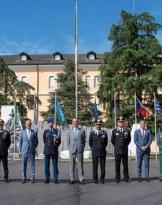The conference was attended by Cesare Patrone (in the photo), head of the state forestry corps, Roberto Moncalvo, president of Coldiretti, Elisabetta Lupotto, director of the agronomy, forests and territory department of the CRA (Council for Research and Experimentation in Agriculture), Nazario Palmieri, moderator of the event and head of the forestry, environmental and territory policy service of the forestry, Enrico Pompei, first executive of the state forestry corps, Patrizia Gasparini and Lucio Di Cosmo of the CRA-MPF, Angelo Mariano and Nicolò Giordano, officials of the body state forestry.
During the meeting the "Forest Map of the Kingdom of Italy of 1936" was presented in vector format, in collaboration with the CFS - Environmental Monitoring Office and the CRA - MPF in support of technical-scientific and development activities in the sector monitoring of forest resources.
 The Forest Map of the Kingdom of Italy was the first forestry cartography project applied throughout the national territory. The cartographic survey of the Italian forests, completed in 1936, was entrusted to the forestry militia which operated through field surveys conducted with expeditious methods.
The Forest Map of the Kingdom of Italy was the first forestry cartography project applied throughout the national territory. The cartographic survey of the Italian forests, completed in 1936, was entrusted to the forestry militia which operated through field surveys conducted with expeditious methods.
The volume "The carbon content of Italian forests - INFC 2005" was also presented, produced by the State Forestry Corps and the Council for Research and Experimentation in Agriculture (CRA-MPF).
Dr. Nazario Palmieri, at the beginning, highlighted the importance of Italian woods, which are constantly growing, in 15 years they have increased by 600.000 hectares and precisely for this reason "we need to encourage this widespread awareness, so that society, the community, can then translate it into propositive actions for the protection of this heritage ".
The importance of forests and forests
But why are woods and forests important? Dr. Enrico Pompei: "Forests represent more than a third of the national surface, and the benefits they give to the community are important, such as the safeguarding of biodiversity, water regulation, the production of oxygen and wood. Another fundamental aspect is absorption of carbon, and therefore the mitigation of climate change. From this point of view, the Italian forests have allowed Italy to achieve an excellent result as regards the commitments relating to the Kyoto protocol (international environmental treaty, entered into force in 2005, to which more than 180 countries have joined, ed) and, this continuous growth of our forests, gives us hope from this point of view. The commitment that must be taken is that of proper management, to protect these new woods. Just remember - continues Dr. Pompei - that in the last 10 years we have passed from 10 and a half million to 11 million hectares, and these woods to be managed, to be cultivated, and to have active sustainable forest management ".
The impact of forest fires
But what is the negative impact of forest fires, how is the carbon balance affected? Dr. Luciano Sammarone of the state forestry corps: "Fires destroy forests. From a landscape point of view they also significantly and prolong the landscape, have a negative effect on the ecosystem and on the soil because in many cases they accelerate the detection of the part surface, so thousands of years of transformation are eliminated. Regarding the carbon balance there is an immediate release of carbon dioxide, which is stored inside the wood and goes directly into the atmosphere, and this is an extremely negative element ".
Conclusions
Forests and woods are important for the economic and social development of the nation, and precisely in this regard the head of the state forestry corps argues that "there is a need for an environmental, agricultural and food protection structure, which represents a world fundamental of our community, because in order to operate you need to be culturally equipped, there is a need for a body of protection, for this reason - continues Patrone - that there is a need for a body of environmental, agricultural, food protection, even more strong".
Monica Palermo













